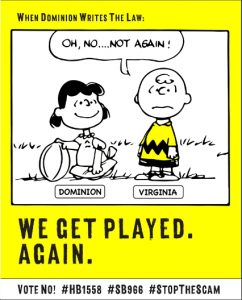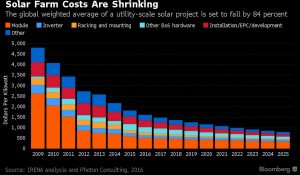The Republican-run Virginia legislature is moving forward, albeit with limited disagreements between the House and the Senate, with legislation essentially written by Dominion. This legislation is the antithesis of classical definitions of capitalism, essentially definitional of “crony capitalism.”
While being promoted as great for consumers for returning over $100 million in excess charges made by Dominion Energy, the reality is that this bill would lock in potentially over ten times that amount without, in essence, any potential for recouping those charges.
Let’s be blunt: the Virginia Way has long had Richmond (on both sides of the aisle) owned and operated by Dominion Energy, a huge political donor (the largest non-political donor, by far, over the years) in the Commonwealth with a large, full-time lobbying crew. Clientelism has ruled, with Dominion getting more or less what it wanted, mostly when it wanted, with trimmings left on the table to satisfy consumer activists, local governments, environmental/clean-energy groups, and large businesses angered by Dominion’s predatory behavior.
To make clear, just as the clientelism isn’t a pure partisan problem, disdain for the legislature’s path forward isn’t partisan. The frustration over Dominion and over the path this specific legislation is taking is bipartisan in outrage, from those concerned about good governance to those with populist streaks. For example, as former Republican Attorney General Ken Cuccinelli has put it:

Cuccinelli (R) wrote to members of the General Assembly … urging them to oppose the legislation, saying they were being played by Dominion.
“To use a dating analogy,” Cuccinelli wrote, “if Virginia were dating utilities, her name and phone number would be on the boardroom wall of every utility in the Commonwealth under phrases like ‘For a good time, call …’
Crony capitalism – as opposed to actual capitalism – abounds in the legislation (HB1558/SB966) to stack the deck in Dominion’s favor and against the operation of the free market. Based on reading discussions of the bills (like so many, the opaque, dense nature of this bill has hindered this citizen’s attempts to parse it), here are several examples,
- “Solar in the public good”: The bill has a statement that 4 gigawatts of centralized and 500 megawatts of utility-provided solar is “in the public interest.” While unclear whether this will truly lead to massive expansion of Virginia’s mediocre solar footprint, this stacks the deck heavily toward the utility provider and against the small operator.
- Nationwide, as a rule of thumb, one-third of total solar capacity is in distributed systems below 1 megawatt in capacity. What justification is there for a skewing, “in the public interest,” to an 8-1 ratio rather than the 2-1 ratio occurring nation-wide?
- When it comes to that 1/3rd below 1 megawatt, a good share of that comes in 5-kilowatt size packages on individual homes — that are owned or leased by the homeowner and installed by a bevy of small installers nationwide. Where, in the legislation, is the promotion of the “small-scale” distributed power that is not owned/operated/controlled by the utility?
- Open market: Renewable energy (solar and wind) prices are plunging, actually shocking all but the most aggressively optimistic analysts with how deep and broad the extent of low-cost clean energy entering the market.
 Increasingly, in market after market, solar and wind aren’t just lower-price options than new fossil-fuel plants, but are quickly becoming lower cost than running existing fossil fuel facilities. There are many factors involved in these plunging prices, with “let the markets operate” capitalism a significant one. Analysis shows that auctions, opening the market to all players to come in with BAFOs (best and final offers), is enabling competition to drive down prices — not just in individual situations but also learning from one auction to foster even lower prices in the next. Under Virginia’s “rate freeze” legislation, what assurance will there be that Dominion will enable free-and-open competition from all players, rather than simply leveraging ratepayers’ money to pay itself to install higher-than-market rate priced solar projects?
Increasingly, in market after market, solar and wind aren’t just lower-price options than new fossil-fuel plants, but are quickly becoming lower cost than running existing fossil fuel facilities. There are many factors involved in these plunging prices, with “let the markets operate” capitalism a significant one. Analysis shows that auctions, opening the market to all players to come in with BAFOs (best and final offers), is enabling competition to drive down prices — not just in individual situations but also learning from one auction to foster even lower prices in the next. Under Virginia’s “rate freeze” legislation, what assurance will there be that Dominion will enable free-and-open competition from all players, rather than simply leveraging ratepayers’ money to pay itself to install higher-than-market rate priced solar projects?
As to the Republican legislature’s disdain for Reagan…
As a Soviet analyst, working in the last decade of the Cold War, one truly memorable item is how President Ronald Reagan used a Russian proverb in what might be the purest definitional statement of how to engage in contractual arrangements with geopolitical adversaries or business partners:
Doveryai, no proveryai
Trust but verify …
Virginia’s taxpayers have competent people working for them in the State Corporation Commission, whose most serious and impactful responsibility is to confirm that regulated utilities (such as Dominion Virginia Power and Appalachian Power) are fulfilling their requirements to meet the public interest (even while meeting shareholder interests). This legislation undercuts, significantly, the SCC’s oversight ability over Dominion so much so that Dominion could be extensively overcharging Virginia’s electricity consumers for over half a decade before there would be any real potential for redressing these abuses. The Republicans (and some Democrats) in the General Assembly are — it seems — asserting that Virginians should trust Dominion to act in Virginians’ best interests, while undermining any ability to verity that that trust is merited.
On both sides of the aisle, supporters of the legislation are touting that the legislation will create a funding stream in the realm of $200 million per year for clean energy, energy efficiency, and improvement of the overall electrical system (ranging from grid cyber-security to tree-trimming to upgrading transformer stations). In a rare blow to Dominion, the House voted to preempt ‘double-dipping’ (that Dominion wouldn’t be able to use those funds as capital investment that would then lead to an increased ‘base’ for determining rates), but the reduced SCC role in Dominion oversight remains. How can any legislator vote, with an honest conscience, for legislation awarding well over a billion dollars to Dominion for expenditure without providing tools for quality oversight of how those funds are used?
- For those supporting the bill due to its “green” (energy efficiency and renewable energy) potential, how can you ensure that Dominion will spend the resources on solar rather than on new, “more efficient” fossil fuel-fired power plants that will burn natural gas sold to it by…yep, Dominion Energy?
- For those concerned about “efficient use of funds,” how can you be assured that Dominion will pursue the most efficient use of these resources in the ratepayers interest rather than the most efficient ways to increase Dominion’s profits?
Actually, for anyone without a vested (clientelist) interest in Dominion Energy, this legislation should generate a lot of “concern.” At the minimum, for anyone invested in good public stewardship, there is no legitimate public purpose in reducing the SCC’s oversight of the regulated utilities — none.
Now, there’s no doubt that the Commonwealth needs investment in improved grid infrastructure. There’s also no doubt that Virginia would benefit greatly from clean energy and has tremendous opportunities in energy efficiency. The resources to do this are not going to come from the taxpayers and are almost certainly only going to come from some sort of compromise bill that will enable Dominion to use ratepayer funds to foster a cleaner and more secure Virginia electricity system. The legislation won’t be perfect and will require compromises. No one has yet convinced me, however, that this bill’s existing “compromises” haven’t compromised the bill to an unreasonable level.




![Sunday News: “Trump Is Briefed on Options for Striking Iran as Protests Continue”; “Trump and Vance Are Fanning the Flames. Again”; “Shooting death of [Renee Good] matters to all of us”; “Fascism or freedom? The choice is yours”](https://bluevirginia.us/wp-content/uploads/2026/01/montage011126.jpg)
![VA DEQ: “pollution from data centers currently makes up a very small but growing percentage of the [NoVA] region’s most harmful air emissions, including CO, NOx and PM2.5”](https://bluevirginia.us/wp-content/uploads/2026/01/noxdatacenters.jpg)












